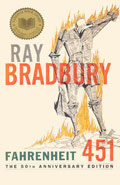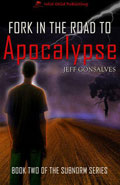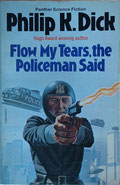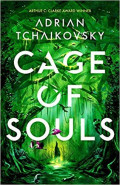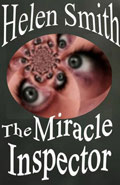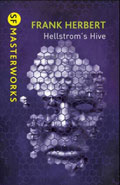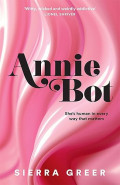Golden State
By Ben Winters

- Golden State
-
Author: Ben Winters
-
Publisher: Mulholland Books
- ISBN: 9780316505413
- Published: January 2019
- Pages: 336
- Format reviewed: Hardback
- Review date: 15/02/2019
- Language: English
In the wake of the 2016 US presidential election, a meme boiled up to the surface of our cultural dialogue about us having entered an age of “post-truth.” As the election showed us, we have arrived into a societal configuration, in which two major ideological groups do not just vote for different parties, but also interpret the world in completely different ways. Hence, the term “post-truth.” On the surface, it seems to members of one side that the other is ignoring “truth.”
It is tempting, then, for members of each side to imagine us harkening back to some “pre-post-truth” world, one in which everyone was capable of making judgments based on “plain facts.” Fortunately for us, as long as the world has good science fiction writers, we will maintain the ability to examine such societal impetuses critically.
Golden State by Ben H. Winters is set in the eponymous Golden State, a country whose borders seem to comprise some portion of modern-day Southern California. In the Golden State, it is illegal to lie, that is, knowingly and intentionally speak a falsehood. A complex system of laws and bureaucracy delineates exactly which kind of speech constitutes actual lying, as opposed to sarcasm, metaphor, and other forms of harmless verbal wordplay. “Raining like cats and dogs” would be perfectly permissible, while, “the rain is cats and dogs,” would be illegal.
Citizens of the Golden State are recorded at all times, although not actively monitored ala 1984. The goal is not to proactively search out disobedience, but rather to capture all of reality and store it into an objectively true record (referred to throughout the novel as “the Record”), so that consistency of the truth can be ensured. With a record of all recorded events, it becomes possible that all citizens may agree on what is “Objectively So” at all times and about any conceivable topic.
Meaning in Conflict
My favorite element of the novel is the semiotic conflict within the title itself. The phrase “Golden State” is the slogan for the state of California. The term “golden” means both “perfect” (as in “golden child”) and “truthful” (as in “the golden rule”). The term “state” can mean both, “a thing’s current configuration” (“state of being”), and “a form of political organization” (“the United States”). The term “Golden State,” the eponymous setting of the novel, thus ends up embodying the very semiotic relativism to which the Golden State is opposed.
The novel’s protagonist is Laszlo Ratesic, a Speculator, whose job embodies another of the state’s internal contradictions. Speculators are essentially detectives, but are so named, because, in order to do their jobs, they must analyze and discuss possibilities, weighing relevant known details against others, and forming entirely new interpretations of events. Speculators are the only individuals permitted to engage in this behavior.
In the novel’s opening chapters, Laszlo will be introduced to a case, whose details will cause him to question the truth that he holds as the foundation of his society. The novel begins with a strong detective procedural vibe and the prose is styled in that vain. Within the first few chapters, Laszlo’s boss introduces him to a rookie partner, Aysa, whom he does not want to be burdened with, but eventually acquiesces to taking on. Lazslo and Aysa’s professional relationship goes through the predictable motions, and, as one would expect, eventually develops into mutual respect (in my opinion, much too quickly to be believable).
The details of life in the Golden State are too vividly and creatively realized for me to write off the novel on the grounds of its stylistic simplicity and character work. The Record is not just an enormous computer database and filing archive, but also enormous building at the center of Los Angeles with enormous underground archives. Citizens each possess notebooks called Day Books, in which they record relevant details of all of their conversations with every other citizen—another mechanism for maintaining veracity. A minor ritual involves tearing out a corner of a page of one’s Day Book and slipping it into the cracks of the wall of the Record building, a way of symbolically becoming one with truth. These are just a few samples of the elaborate, and thematically consistent world Winters has constructed. Though told plainly, the plethora of effective world-building adds up to an immaculately realized and thematically cogent setting.
Dystopic Allusions
Golden State is rife with allusions to previous dystopian novels.
The offices of the Speculators have glass walls internally and externally, as do many buildings across the capital, a subtle allusion to Yevgeny Zamyatin’s We. The presence of a place of exile, of an “in the state” and “outside the state” (a place referred to merely as “exile”) is also reminiscent of We’s greenwall.
A “novel” in the Golden State refers to a rendering of actual events into the form of a narrative. What we would call a “novel,” a work of fiction, is, naturally, illegal. When Laszlo discovers an actual fictional novel, he imagines what would happen if he relinquished it to another agency: it would probably be burned. In this, one hears echoes of Fahrenheit 451 by Ray Bradbury.
Much of the neology present in novel draws on the bureaucratic oppressiveness of George Orwell’s 1984. The Golden State has its own kind of newspeak. Instead of “hello,” citizens greet one another with pithy aphorism of truth, such as “two and two is four” or “one angle of a right triangle is ninety degrees.” The artifacts of collected statements, video recordings, and all the ritual around their access and control, also feels inspired by Orwell’s authoritarian world.
Semiotic Absolutism
The novel’s primary conflict lies in the tension created by the absolute semiotic rigidity imposed by the state and the absolute semiotic relativism proposed by the novel’s villains. While the state wishes to impose one set of interpretations and one set of meanings onto all of reality, the villains hope to bring about a world where everyone agrees that no one’s interpretations will map onto anyone else’s.
As in the real world, neither side is comfortable existing in the middle. Each side reduces the world to a dichotomy, where happiness and security are possible on “their” side, and the “other” side is misery and horror. In a brilliant turn, the novel’s relativist antagonists, it turns out, also refer to themselves as “the Golden State.”
Laszlo is caught in the middle, struggling to figure out how to tell what is true from what is not, struggling to discover a conceptual framework for his world that actually works. As his case crumbles and starts slipping through his fingers, it becomes clear that neither the current state nor the one proposed by the villains will reconcile him to his world.
The way out for Laszlo, the novel suggests, is to reject absolutism of both varieties and become comfortable in a kind of “middle ground,” holding in mind a conception of “truth,” but remaining perpetually open to revision when confronted with differing interpretations.
Concluding Thoughts
What most impresses me about Golden State is the way it tackles enormously complex issues and distills them into prose that is engaging and easy to find oneself falling into. Topics as complex as perception theory and semiotics are encoded into a science fiction metaphor that is at once accessible and believable.
I have already touched on Golden State’s stylistic simplicity, and the way in which Laszlo develops comraderie with his partner extraordinarily quickly. Other character relationships have similar issues. In many cases, characters feel like props, who have been placed conveniently to move the plot along. Upon reaching the reveal, one could argue that that’s the point, but I think one can see these even in the relationship dynamics between Laszlo and characters who are not part of the villains’ plan.
Taken overall, Golden State is a smart, engaging novel that elucidates a topic relevant for both our current era as well as human societies more broadly, past and future.
Written on 15th February 2019 by Matt Buscemi.
